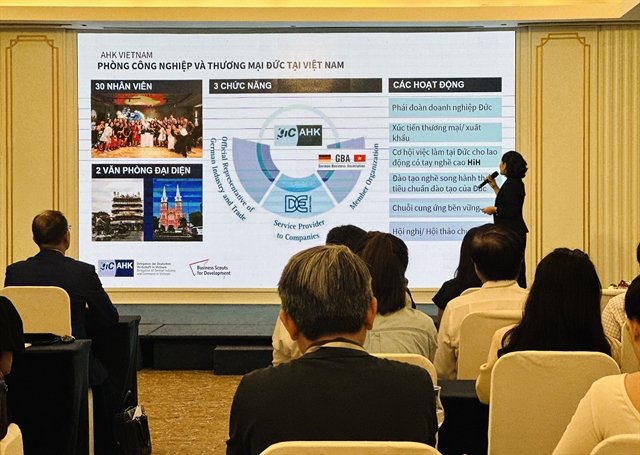 Economy
Economy


|
| An expert delivers a speech at the “Enhancing Competitive Capacity for Textile and Garment Enterprises on the Green Growth Pathway” seminar in HCM City on Friday. — VNS Photo Thu Ngân |
HCM CITY — The imperative for enterprises, including those in the textile and garment sector, to proactively embrace the green transition wave for enhanced global supply chain positioning was highlighted at a seminar in HCM City on Friday.
“Enhancing Competitive Capacity for Textile and Garment Enterprises on the Green Growth Pathway,” organised by the Vietnam Chamber of Commerce and Industry, HCM City (VCCI-HCM) and Global PR Hub, was attended by executives from over 100 textile and garment enterprises.
Experts said global fashion brands are increasingly prioritising green business and encouraging suppliers to adopt sustainable practices.
Renewable energy, especially solar, is a viable long-term solution for sustainable transformation in manufacturing, they said.
Nguyễn Hữu Nam, deputy director of VCCI-HCM, said textile and garment exports are a key component in Việt Nam’s open economy, and underlined the necessity to adapt to new conditions and regulations in export markets.
Nguyễn Thị Tuyết Mai, deputy secretary-general of the Vietnam Textile and Apparel Association (VITAS), said Việt Nam’s free-trade agreements (FTAs) with 53 countries offer favourable conditions for market expansion and improving production and business efficiency.
But she also pointed out that newer generation FTAs impose stricter requirements for green growth, posing a challenge to over 80 per cent of small and medium-sized enterprises due to their lack of resources to invest in eco-friendly production transitions.
Complex requirements such as LEED certification, supply chain due diligence, origin tracing, and ecological design standards have deterred many businesses from making the transition, she added.
Experts said Việt Nam’s textile and garment companies still have considerable room for exports in international markets and so need to learn and comply with new regulations in major markets like the EU and US.
An expert from AHK Vietnam spoke about the EU-Vietnam Free Trade Agreement boosting Việt Nam's competitiveness in the textile and garment industry, but noted that the vague provisions on labour protection and social responsibility could challenge Vietnamese enterprises.
Challenges of the green transition by the textile and garment industry were discussed at the seminar, notably from major markets such as the EU, which are tightening environmental standards, introducing the carbon border adjustment mechanism and implementing the Supply Chain Due Diligence Act.
Safety, particularly during significant investments such as installing photovoltaic systems, was also highlighted as a major concern.
During discussions on exemplary cases and lessons learned from developed countries, VITAS, WWF Vietnam, SolarEdge Vietnam, LONGi, and HDBank representatives delved deep into green transition in advanced countries, opportunities for Việt Nam and access to green credit for enterprises.
Việt Nam has 7,000 textile and garment companies, 80 per cent of them SMEs, which employ three million workers.
Textile and garment exports have consistently remained among Việt Nam's top four exports, and the country is the third largest global exporter.
In the first ten months of this year, its exports were valued at US$33 billion despite a 12 per cent year-on-year decrease. But the full-year target is 9.2 per cent lower at $40.3 billion. — VNS




